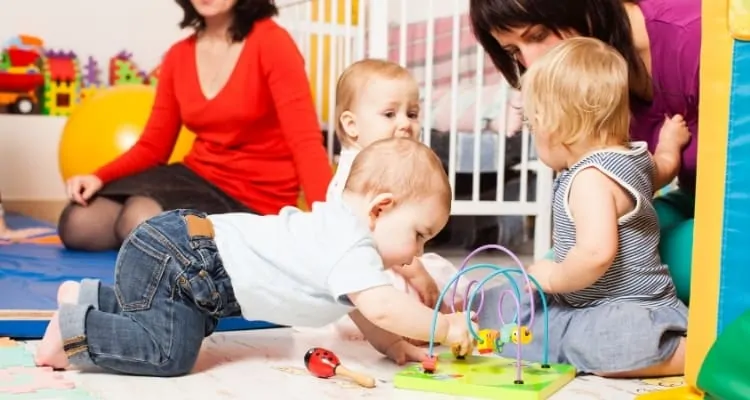How to Find a Good Daycare (Definitive Guide)

This post may contain affiliate links. If you buy through the link, I may earn a commission. Learn More.
Finding a good daycare is not easy.
You will not do a quick search, find a daycare, and be able to drop your child off the next day.
You must know the right questions, take time, and have the patience to find the right daycare for your family.
*FYI some of the links in this article about how to find a good daycare may be affiliate links. If you click and make a purchase we may get a commission (at no extra cost to you). For more info please see our disclaimer.
Materials Needed
The good news is you don’t need any special materials before embarking on your quest for the right daycare.
You may consider using a bullet journal to record the questions you plan to ask of each provider while also leaving space for the answers.
- 【BULLET DOTTED JOURNAL】- RETTACY Bullet Dotted Journal comes in 3-Pack, A5 (5.7" × 8.3") size,...
- 【100 GSM PREMIUM PAPER】- 100 GSM paper is thicker, sturdier, and will stand up to the test of...
- 【ACID-FREE PAPER】- Due to its lack of acidic components, it can preserve documents for a long...
How to Find a Good Daycare: A Step-by-Step Guide
Do you feel overwhelmed by all of the decisions that you are suddenly faced with?
Welcome to parenting!
Luckily, unlike potty training, finding a daycare does have definitive steps that will work for most families.
To find the right daycare be prepared to call as many daycare facilities as it takes. You’re going to ask the same questions of each one, go for tours and get a complete price breakdown in writing before comparing your final choices with each other.
Step 1: Have a Heart-to-Heart With Your Partner (Part One)

This is where you should start every big decision made in the life of your child. If you have a partner with whom you share child care duties, the two of you should discuss what you expect from daycare.
Topics to cover might include:
- Location of the facility
- What programs need to be offered
- Preferences on group size
- Dollar amounts you are comfortable spending
- Which days child care is required
You should also make sure you are both comfortable with a daycare setting. You may find that, after the birth of your child, you are no longer interested in daycare.
You might want to find a solution that allows one of you to stay at home to be a full-time caregiver. Though there are many reasons daycare is a good choice, you do need to make sure it is the right choice for your family.
A single parent doesn’t have to make these types of decisions in a vacuum. They should reach out to trusted friends and family members to bounce some of these ideas around.
Though the final answer is decided by the parent, it is always helpful to have someone else who will listen to your thoughts and provide feedback.
Note:
If your child is older, consider including them in the conversation. They will adjust better to daycare if they feel like they are a valuable part of the decision making process.
They will also be able to provide some insight into the type of environment where they would be the most comfortable.
Step 2: Get the Timing Right

The best time to start contacting daycare facilities is as soon as you are possibly able. Daycare providers often have wait lists. The best daycares have wait lists that can be months or even years long.
Start researching and contacting daycares as soon as you think you need to use one. It is always better to be over prepared.
There are some daycares that have wait list fees and some that don’t. If you find a place that you feel you may be interested in and there is no fee or that fee is nominal, it might be a good idea to join the wait list.
Being on the list does not obligate you to use the facility, but not being on it may be an unnecessary headache.
Looking for a Good Quality Daycare?
Find an affordable and qualified daycare center that fits your needs.
Step 3: Understand the Different Types of Facilities

You may have a vision in your mind of a colorful room with book nooks and play mats. It is teeming with happy children and smiling staff who facilitates free play.
While this is certainly a reality, there are many different types of daycare facilities. Knowing your options is the first step to choosing the right daycare.
Related: 15+ Pros and Cons of Daycare (Parent’s Guide)
A. Daycare Center
The standard daycare center is the one most parents think of when they consider daycare. It is housed in a facility that often has multiple areas for different ages of children. These daycares can vary in the activities they offer and the types of services they provide.
Most require that parents sign a contract stating they will pay for a predetermined length of care. This may vary from one week to a full year. Daycare centers may be run by churches, individual business owners or corporations.
Why should you choose a daycare center?
Daycare centers are good options for families who need full-time, reliable daycare throughout the year.
B. In-Home Daycare
An in-home daycare is operated by a private individual inside their own home. Some have dedicated space that is specifically for the daycare. Others give their young charges access to the entire home.
In-home daycares are popular because they have a limited number of children and are often less expensive than standard daycare. Conversely, in-home daycare doesn’t have the luxury of staff. Curriculum can vary from all-day play to structured instruction.
Why should you choose an in-home daycare?
A parent may choose an in-home daycare because they want the personal touch of a nanny without the high price tag.
C. Nursery School
A nursery school functions much like a daycare center but with a focus on learning. These schools are businesses that can operate in their own facilities. They might also share space in churches or private schools. Some nursery schools focus on one particular area of learning, like reading or religious education.
Nursery schools rarely allow children younger than the age of two. Some require children be even older to attend. They often have abbreviated hours, which make them a good option for families who do not need full-time daycare. Likewise, nursery schools may only offer childcare during a typical school year.
Why should you choose a nursery school?
Choose a nursery school if you want your child to have instruction from an early age and you aren’t reliant on full-time childcare (though this can vary from place-to-place).
D. Childcare Co-Op
A childcare co-op is a different type of daycare that is not staffed by professionals but by other parents. In a co-op atmosphere, you must take turns watching over children in exchange for others doing the same.
Co-ops are extremely varied in nature. Some have a strong focus on religion, others on nature. Many offer typical daycare fare, but with parents in charge rather than a fully trained staff.
A co-op does require that you and other members have some type of certification. You will probably have to, at minimum, take a CPR certification course and go through a background check.
Why should you choose a childcare co-op?
A co-op is the right choice for a family that wants to be actively involved in the daycare setting. It is appropriate for parents whose primary goal for daycare is the development of social skills.
E. Other Types of Childcare
Daycare is the most common type of childcare. However, there are other types that should be considered as you are weighing your options. Before you settle on daycare make sure that one of these other choices isn’t a better fit.
Nannies, babysitters, and au pairs
An individual may watch your child in their home or in yours. This provides your child with direct, one-on-one care. The upside to this is that your child always receives full attention. The downsides are that this is the most expensive option and there is no oversight.
Family members
A family member may be willing to watch your child while you are at work. This can be an excellent choice if you are in a financial situation that doesn’t allow you to spend a lot of money on childcare.
You also know that your child will receive direct care from someone who loves them. However, for this to work, you also need to be comfortable with accepting advice and child-rearing methods that may not match your own.
Parent’s morning out
Some facilities offer programs that provide short bursts of childcare for parents to have some time off while also giving children social skills. These options work very well for a stay-at-home parent who wants or needs a break a couple of times a week.
Deep Dive: Nanny vs Daycare
Step 4: Make a List of Daycare Providers

Once you have talked about your childcare options and you know the different types of daycare facilities you are ready to make a list of daycare providers. This list can be as exhaustive as you like, but make sure you have no fewer than four to six.
Begin your list by asking people you trust for their insight. Those who have children at different facilities can give you the most in-depth and personal opinions about daycares. You can also talk to your doctor or lactation consultant. They may be able to make suggestions based off of personal expertise.
An internet search will give you local daycare options that might differ from those suggested by friends. The same is true for social media groups and online marketplaces where individuals list their daycare openings. Just because a place hasn’t been personally recommended to you doesn’t mean you shouldn’t consider it.
A factor consider when compiling your list is location. Look for daycare facilities that are near your home or place of work. Add those to your list even if you haven’t found information about these daycare centers elsewhere.
Looking for a Good Quality Daycare?
Find an affordable and qualified daycare center that fits your needs.
Step 5: Look for News and Reviews

You have your list. You can start to narrow it down before you even start to make calls.
Start with online reviews. Go to the facility’s social media page and see what families have to say about their experiences.
Check neighborhood review sites that allow customers to provide honest feedback. Join online parenting groups and ask about others’ experiences with each place on your list.
News sites may have information about your chosen daycare facilities. You can do a quick search of each name to learn if any of the daycare centers have had negative news stories or have had licenses revoked for any reason. This is an important step that will help to weed out places that have shown themselves to be reckless or irresponsible.
If you can’t find any information about a particular daycare, don’t take that as a positive or negative sign. You can use other factors to decide if this is the right daycare for your family.
One of these is the QRIS rating. Though not available in every state, the QRIS is a valuable tool that tells you the basics about any daycare facility.
Step 6: Prep Your Q&A List

You are about to embark on one of the most important decisions in your child’s life. You will need to prepare a series of questions to ask the daycare provider.
These questions can be conducted through email, over the phone, or in-person during a tour. Never feel awkward about asking these questions or feel like you are asking too much. The more you know, the easier it will be to make the right decision.
You can use these sample questions as is or come up with your own. This list should provide you with a good jumping off point for making well-informed decisions.
Sample Questions for a Daycare Provider
General Daycare Questions
- What age ranges are cared for at the daycare?
- What does a typical day look like?
- What is your staff-to-child ratio?
- How often are toys and other objects cleaned?
- Do you have a pre-scheduled naptime?
- Are vaccinations required?
- What is your policy for sick children?
- How can a parent reach you with questions outside of business hours?
Staff Related Daycare Questions:
- What are the staff requirements?
- Are all staff members certified and trained in CPR?
- How often do you experience turnover?
- Are you licensed in the state?
Daycare Operating Hour Questions
- What are your hours?
- Can children arrive early/be kept late if needed?
- Do you provide childcare in the evenings or on weekends?
- Are there additional charges for longer days?
- Are there days of the year, or specific holidays, in which you are closed?
- Are we charged for days that are children don’t attend due to vacation and/or illness?
Payment/Cost Related Daycare Questions
- What are the rates?
- Do you charge on a weekly or monthly basis?
- Do you charge an application or waitlist fee?
- Are rates subject to change and, if so, how often?
- Is a contract required?
- Is there a grace period included in the contract if facility isn’t a good fit?
Child Hand-off/Drop-off Related Questions:
- What are the pick-up and drop-off procedures?
- Are parents allowed to enter the facility or are children collected outside?
- Are weapons allowed on premises if the parent has a permit to carry or it is a right to carry state?
- Can grandparents or other approved individuals pick children up if a parent or legal guardian isn’t available?
For Parents of Infants
- Do you accept newborns?
- Do you require either disposable or cloth diapers?
- Can a nursing mother enter the facility to breastfeed?
- Should I provide formula and/or diapers and, if so, how much?
- How do you ensure pacifiers and bottles stay clean?
- How do you ensure safety while babies are sleeping?
For Parents of Toddlers and Older Children
- Do toddlers need to be potty trained before being enrolled at this daycare?
- Will you aid with potty training efforts?
- Do children get outside playtime and, if so, how often?
- Are snacks provided?
- Do you have an allergen-free area for snack time?
- How do you manage behavioral issues?
Step 7: Interview the Daycare

Your first interview is conducted through a phone call or email. You can ask the most important questions immediately so as to avoid any wasted time.
For instance, if you have a newborn, you need to know the daycare accepts babies. If your older child has an allergy issue and the daycare is not set up for those types of needs, that is an easy way to narrow the list and move on.
Most daycare facilities offer a handbook that they are happy to share. It is often already available through their website. If you don’t see it, call and ask for a copy to be sent to your email. Most of the questions listed earlier are covered through that handbook.
Along with having your questions answered is the general nature of the conversation. Does the daycare administrator seem focused or distracted? Are they able to answer your questions with ease and confidence?
Do you feel as though your questions are welcome or are they more of an annoyance? Some of those unspoken factors can heavily weigh on the decision of whether or not to move on to the next step of the process.
Looking for a Good Quality Daycare?
Find an affordable and qualified daycare center that fits your needs.
Step 8: Tour Each Facility

By now you have hopefully narrowed down your daycare choices. At this point you can set up a tour to meet the daycare administrator, some staff and see the facility for yourself.
If possible, schedule the tour for a time when you can see staff interacting with the children. This will give you the best view of how the facility conducts childcare efforts. You can see how many children are in the environment and whether they appear to be happy.
However, for the safety of the children, most daycare facilities only conduct tours after hours.
You can ask any unanswered remaining questions during the tour while also inspecting the area. Things to look for while touring include cleanliness, safety, the amount of space in each area, types of activities, assortment of toys, napping areas, food areas, and outdoor play equipment. Ask to see the restrooms so you can inspect the cleanliness and safety in those areas as well.
If you are at an in-home daycare, you may only be given a tour of the areas where the children are allowed. Make sure to find out how other areas of the home are secured.
A Note About Transportation
Some daycare facilities offer transportation. They may have vans or buses that pick older children up after school or take children on field trips.
If the daycare you attend offers this service and you will be utilizing it, you may wish to view the van or bus to make sure all safety guidelines are in place.
You should also ask about the vehicle’s driver and ensure they have a CDL license and a clean driving background.
Step 9: Financing Child Care

Child care is not cheap. In most instances, the cost of daycare increases along with the quality. In all instances, paying for daycare requires that you budget for this new expense.
The cost of child care varies from state-to-state. The average cost for a daycare center is about $9,000 per year. If that sounds outrageous, remember that hiring a nanny is more than twice that amount.
Nine thousand dollars or more might be out of reach. If that is the case, talk to the daycare center you have chosen about options that might be available to you. Though rare, some may offer scholarships or grants. Many offer financing that allows you to pay over time rather than in one lump sum.
Cost alone shouldn’t be the driving factor when it comes to your daycare options. Daycare generally only lasts until a child is school age, therefore you might be able to tighten your belt for only a few years to ensure a good start to life.
Step 10: Have a Heart-to-Heart With Your Partner (Part Two)

The decision on a daycare is one that requires a significant amount of study and discussion. You and your partner must weigh the pros and cons of each facility.
- Do you like their structure?
- Is it conveniently located?
- Will the cost create difficulty in your lives?
- Can you see your child happily growing in this space?
All of those questions must be asked and both partners should be comfortable with the decision that is made.
A single parent should make a point to find a trusted confidante to discuss all of these matters. A friend who is also a parent is a good option because they know exactly what is at stake when choosing a daycare.
Other options include family members, health care providers or religious leaders. Each of these people will over perspectives that you may not have considered on your own.
It is important to note that the decision you make doesn’t have to be the final one. If you enroll your child at a daycare and find the facility is not a good fit you can always start the process of looking for a good daycare again.
Related: Here’s the Information to Give a Daycare About Your Child
Final Thoughts
Finding a good daycare is a long process with many steps.
However, thoroughness will be rewarded when you find the ideal daycare for your child.
Lastly, keep in mind that once you find a daycare you trust that sending your kid there is still going to be hard. Make sure to read our guide on preparing for your baby’s first day of daycare to learn how you can best prepare for what will be an emotional day.
Did this guide help you in your search for a daycare? Let us know in the comments!
Frequently Asked Questions
-
How do I find local daycares?
A good way to find local daycares is by asking other moms and dads. You can ask moms and dads in parenting facebook groups or people you work with it that you trust who are also parents.
-
What should I look for when choosing a daycare?
You should look for daycares that are clean, have good reviews, have well trained staff and have a positive and nurturing environment.
-
What’s the best age for a child to start daycare?
The best age for a child to start daycares is ideally 12 months of age. Many daycares will take kids as young as 6 weeks.
-
How long will it take to find a good daycare?
It could take as long as 30 days to find, vet, and tour a daycare that you trust. Depending on how long their waitlist is, it could take a couple of weeks to a couple of years for your child to be able to start there.
-
When should you switch daycares?
You should consider switching daycares when your child is unhappy or unwilling to return to daycare or the daycare displays high staff turnover, underqualified team members, or unresolved safety concerns.
-
What age does a child stop going to daycare?
The age a child stops going to daycare is usually around school age, at about 5-6 years of age
Project Summary
How to Find a Good Daycare
Approx: 30 days
-
Have a Heart-to-Heart With Your Partner (Part One)
This is where you should start every big decision made in the life of your child. If you have a partner with whom you share child care duties, the two of you should discuss what you expect from daycare.
-
Get the Timing Right
The best time to start contacting daycare facilities is as soon as you are possibly able. Daycare providers often have wait lists. The best daycares have wait lists that can be months or even years long. Start researching and contacting daycares as soon as you think you need to use one. It is always better to be over prepared.
-
Understand the Different Types of Facilities
You may have a vision in your mind of a colorful room with book nooks and play mats. It is teeming with happy children and smiling staff who facilitates free play. While this is certainly a reality, there are many different types of daycare facilities. Knowing your options is the first step to choosing the right daycare.
-
Make a List of Daycare Providers
Once you have talked about your childcare options and you know the different types of daycare facilities you are ready to make a list of daycare providers. This list can be as exhaustive as you like, but make sure you have no fewer than four to six.
-
Look for News and Reviews
You have your list. You can start to narrow it down before you even start to make calls. Start with online reviews. Go to the facility’s social media page and see what families have to say about their experiences. Check neighborhood review sites that allow customers to provide honest feedback. Join online parenting groups and ask about others’ experiences with each place on your list.
-
Prep Your Q&A List
You are about to embark on one of the most important decision’s in your child’s life. You will need to prepare a series of questions to ask the daycare provider. These questions can be conducted through email, over the phone or in person during a tour. Never feel awkward about asking these question or feel like you are asking too much. The more you know, the easier it will be to make the right decision.
-
Interview the Daycare
Your first interview is conducted through a phone call or email. You can ask the most important questions immediately so as to avoid any wasted time. For instance, if you have a newborn, you need to know the daycare accepts babies. If your older child has an allergy issue and the daycare is not setup for those types of needs, that is an easy way to narrow the list and move on.
-
Tour Each Facility
By now you have hopefully narrowed down your daycare choices. At this point you can set up a tour to meet the daycare administrator, some staff and see the facility for yourself.
-
Financing Child Care
Child care is not cheap. In most instances, the cost of daycare increases along with the quality. In all instances, paying for daycare requires that you budget for this new expense.
-
Have a Heart-to-Heart With Your Partner (Part Two)
The decision on a daycare is one that requires a significant amount of study and discussion. You and your partner must weigh the pros and cons of each facility. Do you like their structure? Is it conveniently located? Will the cost create difficulty in your lives? Can you see your child happily growing in this space? All of those questions must be asked and both partners should be comfortable with the decision that is made.
Tools:
- Bullet Journal

